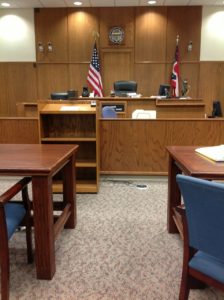The Daubert Standard and Admitting Expert Testimony
Scientific evidence can be very persuasive to a jury and has the potential to seriously sway the outcome of a trial. This is why the Supreme Court put standards in place for how a district court must evaluate whether expert testimony and scientific evidence can be admitted at trial. The Eleventh Circuit Court of Appeals considered the issue of whether the DNA evidence presented through expert testimony in the case of United States v. Barton was sufficiently reliable to be admissible under the Daubert standard.
Admitting Expert Testimony Under the Daubert Standard
In the Supreme Court case of Daubert v. Merrell Dow Pharmaceuticals, Inc., it was established that Federal Rule of Evidence 702 requires that the district court act as a "gatekeeper" in determining whether scientific evidence is admissible at trial. The reason that the court must serve in this role is that scientific evidence presents complex issues that are difficult for the layperson on a jury to understand. Allowing junk science to be admitted at trial and influence jurors could unjustly lead to a wrongful conviction.
Expert Testimony Must be Reliable and Relevant to the Matter at Hand
Therefore, the court must vet the expert opinions to ensure that the evidence presented through the expert witness is reliable and relevant to the matter at hand. The district court must also find that the expert witness is sufficiently qualified to opine on the matter for which they seek to testify. To determine whether scientific evidence is reliable, the district court must examine the testing and methodology employed by the expert to reach his conclusion.
Background on United States v. Barton and Issues Regarding the Daubert Standard

Expert Testimony
In United States v. Barton, the defendant was convicted of violating 18 U.S.C. § 922(g) by being a felon in possession of a firearm. The defendant challenged his conviction based on an argument that the prosecution's expert's opinion should not have been admitted into evidence. At trial, the government introduced DNA evidence from the defendant's gun through its expert witness. The expert witness explained the complex process through which the DNA evidence is tested and how DNA samples are distinguished from others. The defendant argued that the DNA testing methods used by the prosecution's expert witness were not reliable and could not stand up against the proper standard. Whether the prosecution's expert witness was qualified to testify on DNA testing and the relevance of the DNA testing to the ultimate issue at trial were not in dispute.
The Eleventh Circuit rejected the defendant's arguments that the prosecution did not show that the DNA testing methods were reliable under the Daubert standard. The appellate court ruled that there was substantial evidence confirming that the defendant was indeed in possession of a firearm without any of the expert testimony having to be admitted. For instance, the defendant confessed to possessing a firearm upon arrest, and he also confessed to a jailhouse informant later on. Therefore, even if the district court had been wrong in admitting the prosecution's expert testimony, any error was harmless to the defendant.
Challenging the Admissibility of Expert Testimony Under the Daubert Standard
Given that an expert witness opinion can be the turning point in a criminal trial, it is crucial for a defendant to challenge the admissibility of an expert witness's testimony. This is typically done via a motion in limine in advance of trial. One of the strongest ways to challenge the admissibility of the prosecution's expert witness is to consult with an expert witness for the defense to find out what holes might exist in the evidence relied upon by the prosecution's expert. If a district court erroneously admits an expert witness's testimony, then it is imperative to raise the issue on appeal.
One of the reasons why it is important to work with a seasoned criminal defense attorney as early as possible in your criminal case is that they will have the resources to evaluate your case from every angle and retain the most appropriate experts to help with your defense. Attorney Brandon Sample has vast experience assisting clients with these issues and taking on complicated Daubert standard issues on appeal. Consult with Brandon Sample, Esq. about your options for mounting a Daubert challenge against an expert witness opinion that the prosecution seeks to admit.
Recommended for you
Ex Parte Communications By Judge With Jury Required Reversal Of Convictions
At Martin Bradley III’s trial for racketeering, mail fraud, wire fraud, and money laundering, the district court had two ex parte communications with the jury. Bradley’s defense lawyers did not become aware of notes until after his appeal. Bradley filed a 2255 motion arguing, in addition to other things, that the court had violated Rule…
Supervised Release Cannot Be Revoked After Supervision Term Ends
Anthony Holman’s supervised release was revoked for failing to pay restitution and picking up a new charge. However, the violation petition was not submitted until after Holman’s term of supervision had already expired. No summons was pending at the time either. Generally, whenever a U.S. Probation Officer believes that a defendant has violated his or…
Burrage Applies Retroactively To Cases On Collateral Review
In Burrage v. United States, 134 S. Ct. 881 (2014), the Supreme Court held that “at least where use of the drug distributed by the defendant is not an independently sufficient cause of the victim’s death or serious bodily injury, a defendant cannot be liable under the penalty enhancement provision of 21 U.S.C. § 841(b)(1)(C)…




